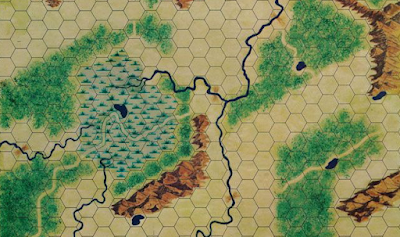The Real Adventure Was the Random Encounters We Had Along the Way
 While there is not – and probably never will be – a universally accepted definition of what constitutes old school gaming, I'd like to make the modest suggestion that some degree of randomness is an essential characteristic of its play (though one should take care not to overdo it). This is not a new suggestion on my part, nor do I think it's an especially controversial one. Take a look at most of the major RPGs of the first decade of the hobby, whether it be Dungeons & Dragons, Traveller, or even RuneQuest, and you'll almost certainly find one or more significant elements of gameplay that depend on the random throw of some dice. In addition, randomness respects the fact that the referee is also a player by taking certain things out of his hands, which, in turn, paves the way for the emergence of a satisfyingly unpredictable campaign.
While there is not – and probably never will be – a universally accepted definition of what constitutes old school gaming, I'd like to make the modest suggestion that some degree of randomness is an essential characteristic of its play (though one should take care not to overdo it). This is not a new suggestion on my part, nor do I think it's an especially controversial one. Take a look at most of the major RPGs of the first decade of the hobby, whether it be Dungeons & Dragons, Traveller, or even RuneQuest, and you'll almost certainly find one or more significant elements of gameplay that depend on the random throw of some dice. In addition, randomness respects the fact that the referee is also a player by taking certain things out of his hands, which, in turn, paves the way for the emergence of a satisfyingly unpredictable campaign. Nowhere do I think this aspect of old school play more apparent than in the case of random encounters. D&D, for example, includes the possibility of such encounters both in the dungeon and in the wilderness. In a similar vein, Traveller, whose basic structure owes a great deal to OD&D, includes an even wider range of random encounters, from the vessels one might find while jumping into a new star system to the alien animals on uncharted worlds to the potential patrons one might run across in starports. I could cite more examples from other games, but I hope my point is clear: old school RPGs considered random encounters an important driver of gameplay, one every bit as important as prepared locales or scenarios.
Earlier today, I was considering the various campaigns I'm refereeing or have refereed over the past few years, particularly my House of Worms Empire of the Petal Throne and Riphaeus Sector Traveller campaigns. In both cases, I have made regular use of the various random encounter tables to determine who or what the characters meet as they chart their course across the world. That's because a freewheeling campaign of any size would simply be impossible without them. No referee, not even the most fastidious, could ever hope to key every inch of the map or keep track of all the monsters, NPCs, settlements, and factions of the game world. Random encounters – and the tables that facilitate them – are thus one of the most important tools of any referee.
The House of Worms campaign demonstrates this again and again. Many of its most memorable moments came not from any plan of mine but through the results of random encounters. Within the first year of the campaign, for instance, the characters found themselves, as the result of a magical mishap, teleported far away from the lands they knew. Because I hadn't anticipated that this might occur, I had nothing prepared and instead made use of a random encounter table, the result of which was an "evil magic-user." I took this cue and ran with it, the evil MU becoming an important antagonist for a while. Later, they were traveling through a desert and I rolled up an encounter with a large number of the dreaded Ssú – too many for them to take on by themselves, leading to their forming an alliance with and organizing the inhabitants of a nearby village in order to fight the Enemies of Man.
Over the course of the last seven and a half years, random happenstance has been the impetus for so many of the little events that have contributed to the campaign's ever-growing color and texture. Indeed, I could convincingly argue that they've played a much bigger role in this regard than most of what I, as the referee, have deliberately introduced into the campaign. That's not to downplay the importance of the referee or his choices. However, I want to suggest that, were the course of the House of Worms campaign left entirely up to things that I had decided, I doubt it would have had the staying power it's demonstrated thus far. I surely would have run out of ideas by now, or at least fallen into predictable ruts, neither of which is conducive to long-term success. Random encounters have helped keep the campaign fresh by throwing me – and the players – curveballs with which we might otherwise not have had to deal.
Consequently, random encounters are not incidental to the play of a successful old school roleplaying game campaign; rather, they are its lifeblood.
Published on October 22, 2022 10:30
No comments have been added yet.
James Maliszewski's Blog
- James Maliszewski's profile
- 3 followers
James Maliszewski isn't a Goodreads Author
(yet),
but they
do have a blog,
so here are some recent posts imported from
their feed.



